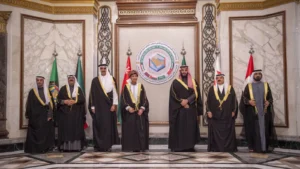Arab states are coming together to prevent a regional war, will the US listen?

Gulf Cooperation Council leaders in Riyadh on 14 December 2021
Mitchell Plitnick writes in Mondoweiss on 11 October 2024:
In a welcome, but under-reported, development last week, Arab states from the Gulf Cooperation Council reportedly “sought to reassure Iran of their neutrality” in the brewing conflict between Iran and Israel.
The stance was expressed by Arab ministers to their Iranian counterparts at a meeting last week in Doha. It was not a formal, public declaration, but rather a commitment expressed in the meetings directly. Initially, reports—particularly the main one from Reuters on which much of the other reporting was based—also said that the Gulf states had explicitly stated that they would forbid the United States from using their airbases to attack Iran, although more recent and updated reports have mysteriously omitted this point.
Still, neutrality does mean forbidding their airbases and territory to be used to launch an attack on Iran. It is important not to overstate the significance of this promise; it was expressed privately, though reported publicly, and it was verbal, not written. So it doesn’t carry the full weight of a formal commitment.
Still, the promise is significant, particularly in light of the total inaction, beyond empty rhetoric, from the Arab leadership since the Israeli genocide in Gaza began. The ongoing exchange of threats, as opposed to an exchange of fire, between Israel and Iran, with the Israelis in ongoing discussions with the United States about it, implies that the Arab commitment has had some effect. American efforts to start ceasefire talks with Iran, while no more than political theater, also demonstrate the effect Arab efforts toward de-escalation have had.
The U.S. left Arab states with no choice
Although the United States has enabled Israeli crimes for decades, there was usually some effort to draw a line when Israeli action posed too grave a threat to “regional stability” or American interests. Even Donald Trump acted, albeit in a horribly misguided and counter-productive way, when he wanted to stop the government of Benjamin Netanyahu from formally annexing the West Bank during his presidency.
But Joe Biden has completely abandoned such efforts. There are many reasons for this, including Biden’s deeply held and self-declared Zionism, his utter and inhuman disregard for Palestinian lives, and his general weakness as a leader.
Another factor, too rarely discussed in the media, but very significant, has been the absence of pressure from the Arab leadership. As the analyst Mouin Rabbani has often pointed out, Arab leaders, particularly the Saudis, have often, in the past, pushed American presidents to rein Israel in when Israeli actions were making matters too difficult for them, potentially straining U.S.-Arab relations.
That hasn’t happened with Israel’s genocidal campaign in Gaza. There have been public statements, but these are to be expected, and they have been limited to objections and condemnations, without any implied threat of consequences.
Without direct contact with the White House or some signal that there is a potential problem for American interests, there is no reason for an American president to worry, knowing that Saudi and other Arab leaders need to make such public statements in support of Palestinians under siege whether or not they are genuinely concerned about it.
The fact that these reassurances to Iran were made public is a much clearer signal to the White House that the Gulf states do not want to see Israel and the United States start a regional war.
